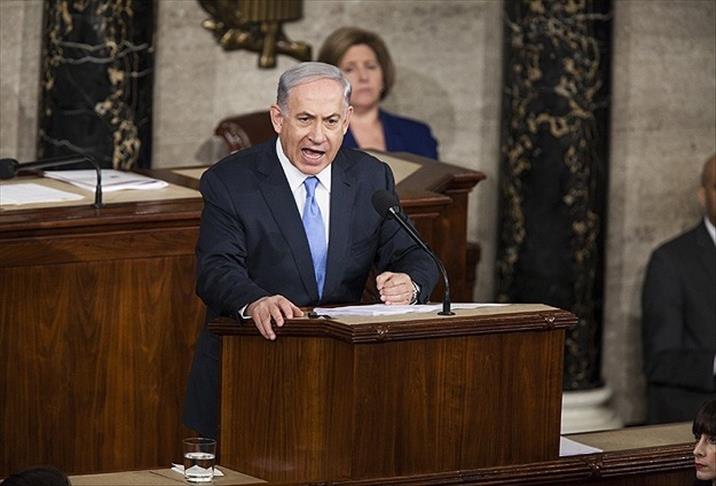
By Ilgin Karlidag
BRUSSELS
As Europe seeks to restart peace talks between Palestine and Israel, there are fears that the Israeli commitment to a two-state solution is a cosmetic one designed to draw out negotiations without finding a solution.
Middle East experts approached by Anadolu Agency described how both Israel and the EU seem more concerned with the resumption of the negotiating process, abandoned more than a year ago, than achieving peace.
"There seems like there is no basis for hoping that peace negotiations will actually move towards anything meaningful," Hugh Lovatt, of the European Council on Foreign Relations, said.
This week saw EU foreign policy chief Federica Mogherini pay a two-day visit to Israel and the West Bank to meet Israeli Prime Minister Benjamin Netanyahu and Palestinian President Mahmoud Abbas in an attempt to relaunch the peace process.
Following their meeting on Wednesday, Netanyahu reiterated his commitment to a two-state solution.
"I support the vision of two states for two peoples - a demilitarized Palestinian state that recognizes the Jewish state," he told journalists.
However, according to Mattia Toaldo, an expert on Middle East peace process and Israeli-Palestinian relations, claimed Netanyahu’s idea of a two-state solution is different to the one Mogherini and other European politicians envisage.
"[Netanyahu’s] idea of a Palestinian state is one that doesn’t control borders, doesn’t have an army and has basically no sovereignty," Toaldo told Anadolu Agency.
Vision of two states
The EU sets out the two-state solution as an “independent, democratic, viable and contiguous Palestinian state living side-by-side in peace and security with Israel”.
"My fear is that both the Europeans and Netanyahu are more interested in the process rather than peace," Toaldo said. "They want to resume the negotiations [to] provide a shield for continuing with the status quo."
His colleague Lovatt also warned that Netanyahu’s comments on supporting a "vision of two states for two peoples" is not the vision widely held by the international community.
"For Netanyahu what is important is [he] is very happy to have a process just so long as it goes nowhere," Lovatt said. "If you look at the make-up of the Israeli cabinet, a majority of ministers are on record as opposing a two-state solution and saving the annexation of large parts of the West Bank."
While Netanyahu assured Mogherini of his commitment to a solution, in March he told Israeli voters that he would never countenance the creation of a Palestinian state.
The right-wing Likud element within his cabinet also points to his government’s opposition to a two-state answer, according to observers.
He appointed Silvan Shalom, who has repeatedly stated his opposition to a Palestinian state, to lead any future talks while Deputy Foreign Minister Tzipi Hotovely, who supports the occupation of the West Bank, told Israeli diplomats on Thursday: "It’s important to say — this country is all ours. We didn’t come here to apologize for that."
Lovatt said Netanyahu’s sincerity about Palestinian statehood can be held in question due to the comments of his cabinet colleagues.
"Even if you see Netanyahu saying this, look at what his ministers are saying which is completely at odds," he said. "Netanyahu says one thing to Europe then his ministers are saying something completely different.
"The big danger is that we have this fiction that Netanyahu truly supports the establishment of a Palestinian state.”
'No contact with Hamas a failure'
One elephant in the room concerned the EU’s relationship with the peace process is the bloc’s refusal to engage with Hamas, which rules the Gaza Strip but is considered a terrorist organization by the EU.
Lovatt called for the EU to be bolder in its Israel-Palestine policy.
"This means reassessment of the EU policy of no contact with Hamas, which I think is a complete failure," he said.
Last December, the EU General Court ruled that the decision to list Hamas as a terror group was not based on “factual imputations derived from the press and the Internet." However, the European Council, composed of representatives of the 28 EU states, decided to challenge the court’s ruling.
"This ruling was clearly based on procedural grounds and did not imply any assessment by the court of the merits of designating Hamas as a terrorist organization," Mogherini said in a statement in January.
However, there are signs of pressure building on Israel. On Thursday, French newspaper Le Figaro published details of a draft UN Security Council resolution that sets an 18-month deadline for talks on a Palestinian state to be completed.
It has been suggested that if this deadline is not met France will recognize Palestine unilaterally, following in the footsteps of Sweden, which was the first EU member to do so last October.
The European Parliament voted for a non-binding resolution calling for recognition of Palestine as a state in December.
Anadolu Agency website contains only a portion of the news stories offered to subscribers in the AA News Broadcasting System (HAS), and in summarized form. Please contact us for subscription options.







